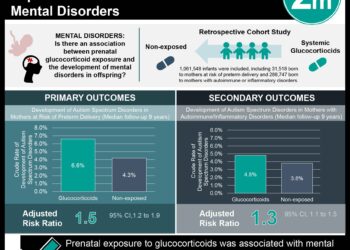Antenatal magnesium sulfate may not improve pediatric neurodevelopment
1. There was no significant decrease in the prevalence of cerebral palsy in pre-term children who received antenatal magnesium sulfate as compared to those receiving placebo intravenous normal saline.
2. While fewer infant deaths occurred in the magnesium sulfate group versus the normal saline placebo group, no significant mortality difference was noted between the two groups.
Evidence Rating Level: 2 (Good)
Study Rundown: Randomized controlled trials (RCTs) have suggested an association between magnesium sulfate supplementation during pregnancy and a decreased incidence of cerebral palsy during childhood. However, the long-term effects of such supplementation, past the beneficial association detected in childhood, have not been examined.
This study demonstrated that antenatal administration of magnesium sulfate (MgSO4) did not have a significant effect on mortality, development of cerebral palsy (CP), or any other motor, behavioral, or cognitive neurological effects by the time the pre-term born children reached school-age. It also showed that the administration of MgSO4 to mothers in preterm labor had no deleterious long-term effects on the children.
Out of around 1200 children included in the initial study, the authors were only able to follow up on 867 of those children. Since both mortality and development of cerebral palsy outcomes barely did not reach significance, it is possible that the results may have been significant with a larger sample size. While further studies are required to fully characterize the long-term effects of MgSO4 supplementation, the lack of adverse effects demonstrated with antenatal MgSO4 is still reassuring, as MgSO4 is a common intervention in obstetrics for tocolysis as well as prevention of eclampsia.
Click to read the study, published today in JAMA
Relevant Reading: ACTOMgSO4 trial: Is it possible to protect the preterm infant brain and to decrease later neurodevelopmental disabilities?
In-Depth [randomized controlled trial extension]: This study is an extension of the Australasian Collaborative Trial of Magnesium Sulphate (ACTOMgSO4), a randomized clinical trial that compared antenatal MgSO4 administration vs. placebo intravenous normal saline on the neurological outcomes after birth. Women at less than 30 weeks gestation who were in imminent labor were randomized to either receive 1g IV MgSO4 or placebo with normal saline and followed for up to two years. This paper extends the findings to 7-8 years of age by following up 867 of the children who participated in the original study. Outcomes of the study included overall mortality, the diagnosis of cerebral palsy, motor function, general intellectual ability, academic skills, attention, executive function, behavior, growth, and function. Age was corrected for prematurity to decrease potential bias and the study team was blinded to previous results of each child. Results were adjusted for various characteristics (inc. race, native language, social class, and education level of the parents) to avoid confounding bias. Results showed that there were no significant differences in mortality (RR 0.80; 95% CI 0.62-1.03; p=0.08), nor any of the other outcomes of the study between the two groups, even when adjusted for confounding variables.
More from this author: The CLARITY trial: Adding clopidogrel to STEMI management [Classics Series], Aspirin vs warfarin in atherosclerotic intracranial stenosis [Classics Series], The ARISTOTLE trial: Apixaban vs warfarin in atrial fibrillation [Classics Series], The TRITON trial: Prasugrel vs clopidogrel in ACS [Classics Series], Vena caval filters in pulmonary embolism prophylaxis [Classics Series]
Image: PD
©2012-2014 2minutemedicine.com. All rights reserved. No works may be reproduced without expressed written consent from 2minutemedicine.com. Disclaimer: We present factual information directly from peer reviewed medical journals. No post should be construed as medical advice and is not intended as such by the authors, editors, staff or by 2minutemedicine.com. PLEASE SEE A HEALTHCARE PROVIDER IN YOUR AREA IF YOU SEEK MEDICAL ADVICE OF ANY SORT.







